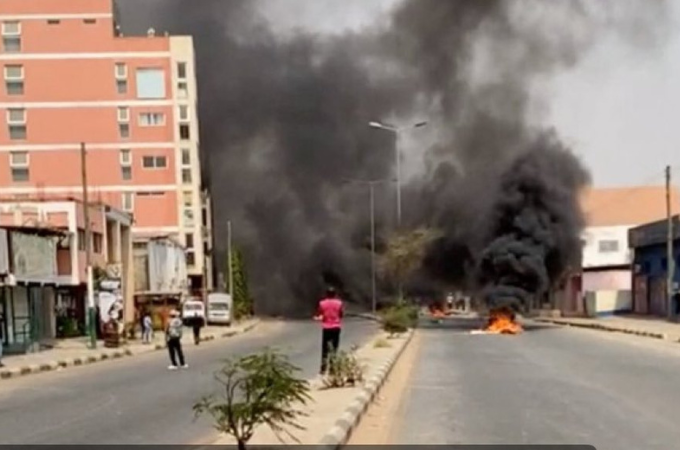Luanda – At least three people were killed and over a thousand arrested on a second day of looting and protest in Angola Tuesday, a day after four died in violence during a strike against fuel price hikes.
Transport in the capital Luanda remained suspended and shops closed after Monday’s unrest, while sporadic gunfire was heard throughout the day and people again raided shops, AFP reporters said.
The strike was the latest in a series of protests after the price of fuel was hiked from 300 to 400 kwanzas ($0.33 to $0.43) a litre on July 1, squeezing living costs for the millions of poor in one of Africa’s top oil producers.
Police on Tuesday night said a police officer had been killed in the province of Icolo e Bengo, near Luanda.
In the afternoon, the local TV Nzinga showed women weeping over a body in a street in the capital’s central Cazenga area as people ran out of a supermarket carrying food and goods. The report did not say how the person was killed.
In the same area, a young man was killed near a supermarket, apparently by a stray bullet, an AFP reporter said.
📍Angola 🇦🇴
Police in Angola say four people were killed and 500 arrested after protests in Luanda turned violent.
The unrest began as a three-day taxi strike over a 33% diesel price hike, introduced in early July as part of fuel subsidy cuts.
Thousands joined Monday’s… pic.twitter.com/WKbBIsAsPJ
— newZWire (@newswireZW) July 29, 2025
“We have arrested 1,214 suspects,” Deputy Commissioner Mateus Rodrigues said in a press briefing on Tuesday evening, adding that the number was likely to rise as “investigations continue”.
Police had announced Tuesday morning that four people were killed in the unrest on Monday, but did not mention further civilian victims in their evening briefing.
Protests and unrest were also reported outside of the capital, including in the city of Huambo, around 600 kilometres (370 miles) north of Luanda, Rodrigues said.
Images on social media also showed protesters in the coastal city of Benguela, south of the capital.
“The security situation is considered stable,” Rodrigues said Tuesday night.
The Portuguese-speaking country of more than 36 million people has a high inflation rate that neared 20 percent in June, while the unemployment rate hit almost 30 percent, according to the national statistics authority.
“We are tired … they must announce something for things to change … for us to live in better conditions,” a protester told TV Nzinga.
“Why do you make us suffer like this? How will we feed our children? The prices have to go down,” a woman said, addressing President Joao Lourenco, whose MPLA party has held power since independence from Portugal in 1975.
‘Outcry of the people’
Local media reported security forces had used tear gas and rubber bullets to disperse the crowds and looters on Monday.
The New Alliance of Taxi Drivers Association (ANATA) distanced itself from the violence but said the three-day strike would continue.
It “has become clear that the voice of the taxi drivers reflects the outcry of the Angolan people”, it said in a statement.
The attempts by Angola’s🇦🇴 President João Lourenço’s government to hike the price of diesel by one-third this month, as part of a long-running government drive to curb costly subsidies and shore up public finances, has plunged the country into deadly violence.
Protests in… pic.twitter.com/T5k33h0QV1
— Kennedy Wandera (@KennedyWandera_) July 29, 2025
Around 2,000 people demonstrated against the fuel hike on Saturday, with protests also held the previous two weekends.
Human Rights Watch said police had used excessive force in the July 12 demonstration, including firing tear gas and rubber bullets.
In a joint statement on Monday, civil society groups condemned the July 19 arrest of a protest organiser, saying he was a “victim of the oppression in Angola.”
The demonstrations were a “direct consequence” of the government’s failure to address unemployment, high living costs and a decline in public services, the Uyele civic group said.
It is “urgent to understand that we are facing a serious symptom: the social exhaustion of a youth with no alternatives”, it said in a statement.
Follow African Insider on Facebook, X and Instagram
Picture: X@smutoro
For more African news, visit Africaninsider.com
Source: AFP


